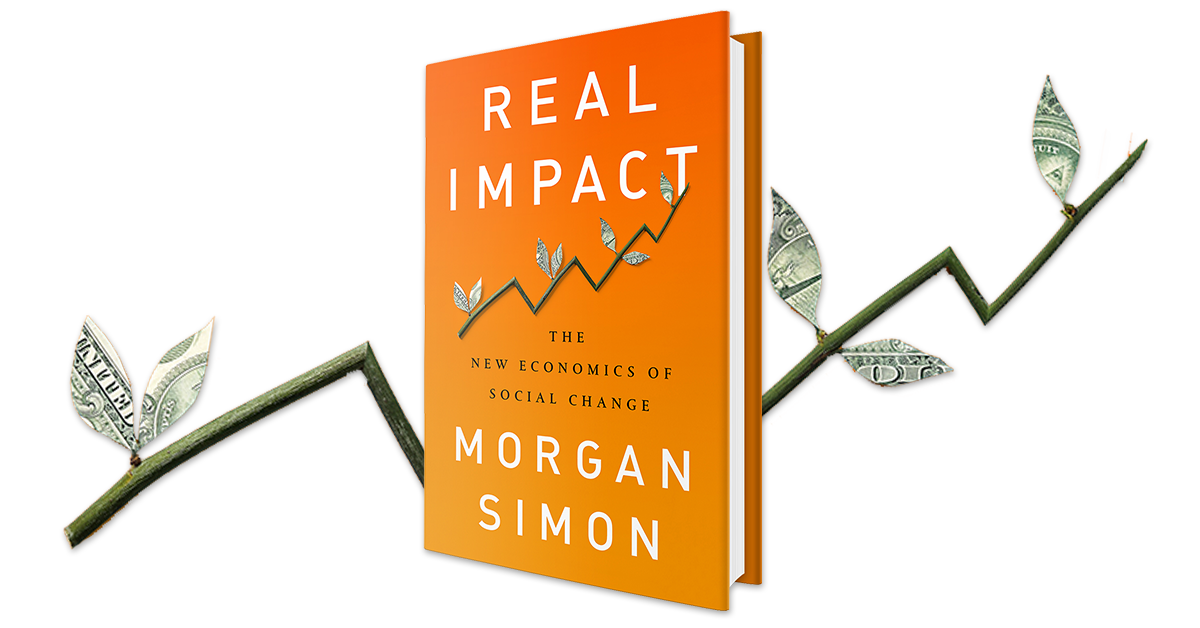“Perfect” may be the enemy of “good”, but “better” ain’t always its friend.
Fundamentally, that is the most damning praise for impact investor Morgan Simon’s Real Impact: The New Economics of Social Change.

Simon’s book is a guide to better divest from harmful industries and businesses while investing in and founding endeavors that align with socially responsible values. It’s also a critique of philanthropy as it exists today, in the form of charitable nonprofits and ethical-as-branding for-profit enterprises.
While in Sierra Leone in 2003, Morgan noticed that aid, in general, makes money for lots of middle income folk delivering it without fixing the underlying situation and usually keeps the recipients dependent on outside funds. Sometimes, well-meaning gifts make the local population more dependent when they can’t start businesses to compete with the free food and clothing deluging their communities.
Nonprofits can do harm, and investments that do good can also do well.
Green energy can be more profitable than fossil fuels with no other considerations given, and still give a return to investors while working within communities to, for example, install wind turbines in Oaxaca, and share the project’s profits fairly.
So, Simon argues, we as a society should invest in self-sustaining businesses that make the world a better place and insist on better metrics for measuring that, which Simon then lays out in some detail as well as rules of thumb for how people interested in such work ought to go about it.
All of this convincing as an improvement over the current situation.
But is it enough of an improvement to matter?
We’re going to come back around to that, but as deep a problem is the question of who this book is even for. It’s written in tone for a wide audience, but relevant to only a narrow slice and meaningful to much less.
When half of all Americans own no stocks at all and would have trouble coming up with $400 in an emergency. There’d be more of a mass appeal for the idea of socially responsible investing if wealth inequality wasn’t such a problem in this country. Ten percent of families own 92 percent of stocks, and the top 1 percent of Americans own more wealth than the bottom 90 percent.
In terms of general advice, moving from your savings accounts in banks with questionable practices into credit unions and private debt funds is a good one.
But you don’t have to be in “There Is No Ethical Consumption Under Capitalism” camp to feel like Simon’s incrementalism is mostly about people who were dealt a Royal Flush at birth feeling less guilty than it is embarking upon the rounds of practical problem-solving that she calls for in her book.
Put another way, even the best and most efficient philanthropy can only plug a leaking dike. Public policy is what builds or blows up the dams. The Koch Brothers, Robert Mercer, and other conservative plutocrats figured this out and have been blowing up dams for years, with an enormous return on their investments.
Early on, Simon quotes James Carville’s Clinton campaign mantra: “It’s the economy, stupid.” What she seems blind to is that his slogan was about winning an election and the notion of Americans pooling their resources to get things done.
Even more fatally damaging to Simon’s book is her own mention of the provenance of American impact investing: Quakers refusing to invest in slavery in 1758. Yet, a hundred years later, there were more people enslaved, slave cotton was central to the global economy, and slavery was more profitable than it had ever been.
Two years after that, Abraham Lincoln won the presidency, and more was done to end slavery in the subsequent five years than all the five score prior.

